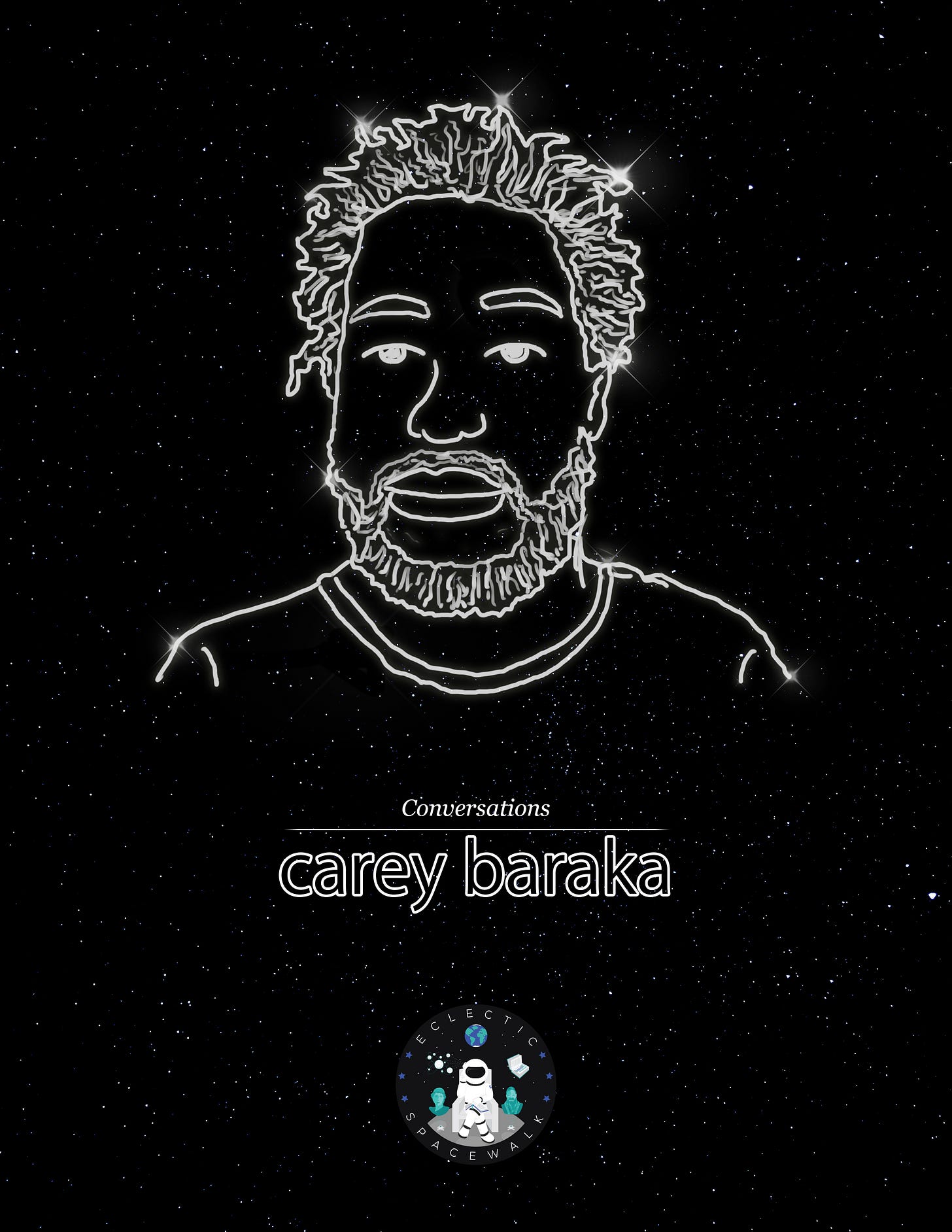A conversation with Writer, Carey Baraka—
Read & Listen on Substack
Hey Eclectic Spacewalkers!
vijiti kwenye kifungu haziwezi kuvunjika “Sticks in a bundle are unbreakable.” - Kenyan Proverb
“If you want to go fast, go alone; if you want to go far, go together. “ - African Proverb
This past month, I sat down with Carey Baraka. Carey is a writer from Kisumu, Kenya. Carey has bylines in publications such as Popula, Lithub, Foreign Policy, and Johannesburg Review of books. He also sings for a ‘secret choir’ in Nairobi.
We came across Carey’s writing in his essay The failed promise of Kenya’s smart city. It is a thought-provoking article that draws from history, economics & political theory, along with connecting details only available to someone on the ground.
“African governments keep burning money planning smart cities by following a McKinsey blueprint.
But will any actually be completed?…
It is unlikely that Konza will ever reach the form it was intended to. But then, no smart city in the world has been completed that perfectly accords with its initial claims or early plans. As the Kenyan government’s finances have collapsed, brought down by excessive loans and a culture of malfeasance overseen by President Kenyatta, Konza’s future seems especially dire. For the 2021/22 financial year, it has been allocated $168 million, a figure dwarfed by the amounts allocated to Kenyatta’s newer, less ambitious projects. Despite all this, the dream of a smart city, as crafted and packaged by McKinsey consultants, continues to be used by local administrators to sell a version of Kenyan modernity.
However, even administrators themselves admit that technology isn’t a magic bullet. Writing in the Africa Journal of Management in 2017, Ndemo argued that “the spread of digital technologies alone will not unlock any development opportunities.” Yet much of the talk in Kenyan policy circles around the potential of digital technologies ignores the fact that tech doesn’t fix failing systems.To offer two recent local examples: A sophisticated Huawei-built surveillance system installed in Nairobi to reduce crime had almost the opposite long-term effect. While there was a 46% reduction in crime rates in the first year, the next year it was up by 13%, and crime then ballooned by an additional 50% between 2016 and 2017.
A $63 million electronic vote-tallying system designed to prevent interference in the 2017 Kenyan general elections failed even more spectacularly. After the head of technology for the country’s electoral agency was murdered days before the vote, his login credentials were allegedly used to access the system, and Kenyatta was declared the winner. The election results were thrown out by the country’s Supreme Court a few weeks later, on account of multiple technical discrepancies, but Kenyatta went on to win 98.26% of the vote in a new election whose fairness was contested by multiple electoral commissioners.Despite these and many more examples, rhetoric around technology continues to ignore the fact that it is always an expression of human intention. Similarly, smart cities are not cure-alls for socioeconomic problems but rather ways to distract citizens from bigger, structural ones.”
Our conversation was wide-ranging, illuminating, and a great example of us tripping over our own truths. We discussed Kenya’s geography and colonial past, along with how Carey grew up with many western influences, like Harry Potter.
Below are timestamps of the conversation to skip around (or just clear your mind and press play to hear a thoughtful conversation).
We thank Carey for his time, research, and eclectic mind. Enjoy the conversation, and until next time - Ad Astra!
Timestamps:
“I am alive because my Kenyan great-grandfather quarantined 100 years ago and here we go again” (01:32)
“Growing up in Kisumu, we were always aware of the train, but only in the back of our minds.” (05:25)
Carey’s experience growing up in Kenya (13:25)
Carey’s influences on his curiosity and learning development (19:45)
Carey talks about roots, place, silence, memory, and identity (27:30)
Carey’s writing & editing process, and how he channels his experiences & ‘the muse’ during flow states (40:30)
Carey’s essay on Konza, Africa’s failed smart city (46:30)
Carey’s push to highlight women African writers (56:30)
Carey’s answer to ‘The Overview Effect’ question (01:05:42)
Other writing examples:
“Sometimes, the writers move outside Nairobi—to a house in Kajiado, on the edge of the forest, or to a house in Marsabit, by the side of a mountain—but still, these parties, a lot of times, are the biggest ways that people build community and power.”
“Nobody we knew ever boarded the train; no one owned a train set or train paraphernalia. In fact, apart from the train at the annual agricultural show, no one had ever encountered one up close.
Slowly, we all moved away, to Nairobi and Eldoret and the US and Europe, in search of education. We took the bus to Nairobi, or we drove, or we flew.
No one took the train.
“If you must include a person from the area, make sure you get one holding four, or better still, five AK-47s...
Throughout the article, adopt a sotto voice, in conspiracy with the reader, and a sad I-expected-so-much tone. Establish early on that your liberalism is impeccable, and mention near the beginning how much you love Northern Kenya, how you fell in love with the place and can’t live without her. Northern Kenya is the only part of Kenya you can love—take advantage of this.
Six or seven AK-47s on the cover of your article is an excellent choice.”
“My observation of African women writers redefining society in literature led me to compile this list. These authors have largely moved beyond Bessie Head’s remit of merely mirroring society, and are, instead, not only producing reflections, but also explaining what it took to arrive at these presentations and what’s been missing.
Dust by Yvonne Adhiambo Owuor
Half of a Yellow Sun by Chimamanda Ngozi Adichie
Homegoing by Yaa Gyasi
The Hundred Wells of Salaga by Ayesha Harruna Attah
Beneath the Lion’s Gaze by Maaza Mengiste
The Old Drift by Namwali Serpell
Kintu by Jennifer Nansubuga Makumbi
House of Stone by Novuyo Rosa Tshuma
Multiple titles by Aminatta Forna
Out of Darkness, Shining Light by Petina Gappah”
“This, then, was the magic of Supa Strikas: eschewing a globalized uniform comic, they had different versions of the comic in different countries. Sure, while the core tenets might have been the same in all the editions, the identifying principles were tied to the country it was sold in. For example, while the captain, Dancing Rasta, was a Rastafarian mountaineer in all the countries, in Nigeria he was called Kazeem Oluwole Thunder aka Dancing Rasta, while in Kenya he was called Sam Otieno aka Dancing Rasta.”
“But what does it mean when the physicality and demographic of home remain constant, but neither of the two can remember the person? Is the person’s home still their home?
What happens when a country loses its collective memories? What possibilities of pleasure does it lose?”
Watch on YouTube:
More on Carey Baraka:
Website: https://careybaraka.com/
Twitter: @CareyBaraka
More on Eclectic Spacewalk:
Subscribe to Substack Newsletter
Listen to all podcasts on Anchor
Follow Eclectic Spacewalk on Twitter













Share this post